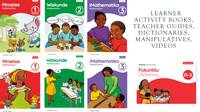Examining Successful Numeracy Programs: Evaluating learner mathematics outcomes in an RCT in South Africa
The Marko-D test is based on an empirically validated model of children’s progressive understanding of numerical concepts. The model was developed in Germany, based on theoretical suppositions and empirical data (Fritz, Ehlert & Leutner, 2018).In the model, the number concept is viewed as a requirement for the construction of arithmetical skills. These concepts gradually build upon each other, creating a continuum (or a pathway of learning progression) of increasing complexity (Henning, Ehlert, Balzer, Ragpot, Herholdt, & Fritz, 2019). This is in line with the South African school curriculum for the foundation phase (elementary school) which requires the development of basic number concepts.
The Marko-D is a story-based, individually administered oral test, which provides diagnostic information regarding the child's number concept development (Herholdt, 2017), which in turn can be used to inform re-teaching, interventions and remediation. In 2022 JET, in collaboration with Bala Wande set out to expand the existing South African version of the Marko-D from the four language versions (English, Afrikaans, isiZulu and Sesotho) validated by the University of Johannesburg and published in 2019 (Henning, Ehlert, Balzer, Ragpot, Herholdt, & Fritz, 2019) include a Sepedi version. A second round of piloting was completed in the third term of 2022 in a sample of in excess of 1800 grade 1 learners. A Rasch analysis was carried out and the results were reported at the CIES conference in Washington DC on 21 February 2023 by Dr Ingrid Sapire who is the Head of Maths at Funda Wande, based at WITS University. A final pilot of the Sepedi version is planned for 2023 as well as expanding the validation process to include concurrent validation with the Hybrid EGMA used in the Bala Wande initiative.
View the presentation here

